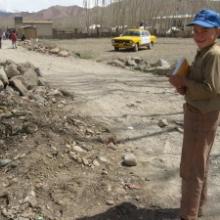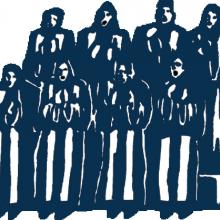Climate change
More important than the celebrities or politicians marching on Sunday, members of the faith community came out in droves to support the rally. The Huffington Post reported on the wide variety of faiths that were represented at the march. A reporter from Christianity Today wrote, “Almost every conceivable strand of society was represented in the huge column of humanity — not only were there groups of Methodists and Baptists rubbing shoulders with Catholics and Presbyterians, there were Christians marching with Muslims, Jews, pagans, atheists and Baha'i. Anti-capitalist protesters stood alongside 'Concerned Moms for the Climate;' doctors, firemen, and vegans held banners next to indigenous people and victims of Hurricane Katrina.”
The reasons that thousands of individuals came out to the streets of New York City on Sunday are vast and personal. But for many members of the faith community, spreading awareness about the decaying state of God’s creation was a moral obligation. Signs such as “Jesus Would Drive a Prius” and a life-size moving Arkrepresented the importance of taking care of God’s creation throughout the rally. In a recent interview with the National Catholic Reporter, Steffano Montano, a theology professor at Barry University in Miami, said as a Catholic, there's a spiritual responsibility to combat climate change.
"By understanding creation, we can come closer to the Creator. It's an added spiritual responsibility. Justice for the earth is something that affects everybody. It's going to affect my daughter, my grandkids. It affects the poor in ways we are still trying to come to terms with. And it's our fault. So that's why we're here. It's on us to make a difference," said Montano.
Reuters reported today that UN Secretary General Ban Ki-moon is starting his drum beat to gets heads of state to his emergency climate conference in New York at the end of the month.
“Ban wants heads of state at a Sept. 23 gathering in New York to outline how their countries will contribute to a mutual goal to contain rising temperatures," said Selwin Hart, the Barbadian diplomat helping to spearhead the conference. The final deal is due to be signed in Paris in 2015, according to Reuters.
This one-day, “leaders-only” Climate Summit is somewhat unprecedented. U.N. climate negotiation meetings are usually called by the executive secretary of the UN’s climate caucus (UNFCCC) and attended by directors of environmental agencies. Ki-moon is switching things up because, as we’ve learned, effective policy to reverse global warming is about economics, not science or technology.
“You don’t control economic policy at national level if you’re an environment minister,” said Michael Jacobs, a former climate change advisor to the U.K. government.
Here in Kabul, one of my finest friends is Zekerullah, who has gone back to school in the eighth grade although he is an 18-year old young man who has already had to learn far too many of life’s harsh lessons.
Years ago and miles from here, when he was a child in the province of Bamiyan, and before he ran away from school, Zekerullah led a double life, earning income for his family each night as a construction crew laborer, and then attempting to attend school in the daytime. In between these tasks, the need to provide his family with fuel would sometimes drive him on six-hour treks up the mountainside, leading a donkey on which to load bags of scrub brush and twigs for the trip back down. His greatest childhood fear was of that donkey taking one disastrous wrong step with its load on the difficult mountainside.
And then, after reaching home weary and sleep deprived and with no chance of doing homework, he would, at times, go to school without having done his homework, knowing that he would certainly be beaten. When he was in seventh grade, his teacher punished him by adding 10 more blows each day he came to school without his homework, so that eventually he was hit 60 times in one day. Dreading the next day when the number would rise to 70, he ran away from that school and never returned.
Now Zekerullah is enrolled in another school, this time in Kabul, where teachers still beat the students. But Zekerullah can now claim to have learned much more, in some cases, than his teachers.
The reality of climate change can be tough information to absorb, and if you’ve known for a while, it can just plain get you down. Yes, rising carbon pollution is leading to global warming. The impacts are already happening now, especially in poor countries and on our coasts. So now what? In the face of a problem on a global scale, what are we to do? Here are four suggestions.
1. Pray.
The massive scale of global warming is a reminder that we are only human. It’s overwhelming to think about and difficult to know where to start. The good news is, God is waiting for us to hand over all our burdens. This is God’s world, not ours – a perspective that can inform not only our outrage over what humans have done to the creation, but also our response. We can be the hands and feet of Christ, doing the work God calls us to do, but we are not the saviors of the world. Knowing that can be both humbling and strengthening. Prayer is a great place to start if you’re trying to figure out what to do about climate change, and it’s an equally important place to return to if you’ve been fighting the good fight for years (exhaustion and burnout are a real thing in this line of work!).
The deep, dark secret of the church is that the beliefs and convictions of Christians are often shaped far more by the hymns we sing than the theological tomes gathering dust on our bookshelves. Songs are avenues for praising God, but they are also tools for imparting knowledge. Singing is a theological exercise, so the words printed in hymnbooks or flashed on screens deserve attention and reflection.
“How Great Thou Art” has been sung in churches, automobiles, and probably the occasional shower since the late 19th century. Long used in traditional worship services, many contemporary artists are offering their own renditions of this classic and adapting it for more contemporary settings. Even Carrie Underwood (no relation) is getting into the act.
This is an ode to God’s majesty and power. It testifies to the beauty created by God’s hand and witnesses to the connection between the love behind God’s creative acts and the love poured out by Christ on the cross.
The famous opening line, “O Lord my God, When I in awesome wonder, Consider all the worlds Thy Hands have made” sets the stage. They also easily get stuck in your head playing on endless loop.
Creation – stars, thunder, forest, birds, majestic mountains, gentle breezes, and everything else – indicates the greatness of God. It provokes wonder among us humans, forcing us to acknowledge the subordinate relationship between creature and Creator. We cannot do what God has done; our accomplishments will always pale in comparison.
BETWEEN 6:30 AND 7 nearly every morning, a dark rumble drifts up through the chilled air from the railroad tracks at the bottom of our hayfield in the Adirondack foothills of New York. A line of more than 100 black tanker cars, mostly full of fracked Bakken oil from North Dakota, rolls southward. They will pass the field where our neighbor’s kids play, then close alongside beautiful Lake Champlain, which defines this region, and on to Albany, where the oil will be put on barges and floated down the Hudson River to New Jersey, to be stored or refined.
Tanker cars like these have been blowing up recently. An accident north of us, over the Canadian border, flattened a downtown and killed 47 people. These cars carry a mix of crude oil and volatile compounds arising from the fracking process, making them dangerously flammable. I worry about my small town’s volunteer fire fighters, all of whom I know personally and admire greatly, who do not have the expertise or the equipment to deal with an accident like that.
Watching the tanker cars, I am also haunted by a scene seared into my memory five months ago. We are driving east along U.S. Route 2 in North Dakota, our small camper in tow, trying to pass through Williston, smack in the middle of the Bakken oil fields.
As the sun sets, we see hundreds of oil and gas rigs flaring excess volatile gases in huge plumes of orange flame. Processing plants spew fumes of God-knows-what. There are row upon row of metal trailers, boxes really, actually used as housing for people. Unrelenting traffic beats a path on the undivided highway under furious construction, with no breakdown lanes or turn-offs for miles. Huge water tankers and oil trucks force us to move onward at 60 mph; there will be no rest for us here, as all campgrounds, gas stations, and parking lots are filled with the rigs of the temporary workers.
ON JUNE 2, Environmental Protection Agency administrator Gina McCarthy announced the next phase in the Obama administration’s war on carbon pollution. The Clean Power Plan aims to reduce carbon-dioxide emissions from existing fossil-fuel power plants (the largest source of carbon pollution in the U.S.) 30 percent by 2030. That same day the stock market closed with record highs, and more than 173 companies and investors sent a letter to President Obama in support. Business understands that these regulations are good for long-term economic health.
State governments have welcomed the new plan because while the carbon limits are fixed, the path to achieving them is flexible. It allows both “rate-based” and “mass-based” methods of reduction, something unusual for the EPA, thus allowing some states to target specific industries and others to aim for overall carbon reductions. Catholic social teaching includes the principle of “subsidiarity”—let the most competent authority closest to the problem determine what works best in achieving a common-good goal. The Clean Power Plan that McCarthy, a Catholic, has rolled out does that. Yet it’s not enough and it’s not fast enough to beat our ecological endgame.
President Obama has pledged to reduce U.S. greenhouse gas emissions 17 percent below 2005 levels by 2020. To this end, he has 1) steadily increased car and truck fuel-economy standards; 2) required permits and set strict emission standards on all new fossil-fuel power plants; and 3) taken smaller, interlocking steps, such as establishing wind and solar renewable energy production on public lands, working with China to phase out hydrofluorocarbons, and significantly restricting funding from U.S. foreign aid agencies for new coal plants in other countries. This fall he may launch a low-intensity war on methane pollution from fracking and landfills. It’s not enough. There are too many loopholes.
This week began in song and prayer outside the Environmental Protection Agency.
The government employees walking past our prayer circle definitely thought we were unusual; for Sojourners, though, publicly witnessing to our calling as Christians in care for creation is just another day on the job. We gathered with interfaith partners for a morning blessing to kick off the EPA’s hearings on the Clean Power Plan – an ambitious plan to curb carbon emissions from our largest source, power plants. Our goal was to show EPA and the nation that people of faith care deeply about what human sin has done to creation, and how all of God’s creation – including people – are suffering and will continue to suffer from climate change.
The next day, I was back at the EPA, this time to offer my testimony during their second day of hearings.
Worried about global warming, a growing number of churches and other faith groups are divesting their holdings in fossil fuel companies, which release large amounts of carbon dioxide and other greenhouse gases into the atmosphere.
“The warning in Scripture that ‘the wages of sin is death’ could not be more literally true than it is in the case of fossil fuels,” said Serene Jones, president of New York’s Union Theological Seminary, whose board voted in June to divest its $108.4 million endowment from fossil fuel companies.
“While we realize that our endowment alone will hardly cause the fossil fuel giants to miss even half a heartbeat, as a seminary dedicated to social justice we have a critical call to live out our values in the world. Climate change poses a catastrophic threat, and as stewards of God’s creation we simply must act.”
Rabbi Moti Rieber travels the politically red state of Kansas armed with the book of Genesis, a psalm and even the words of Jesus to lecture church audiences, or sermonize if they’ll let him, about the threat of global warming.
“My feeling is that I’m the only person these people are ever going to see who’s going to look them in the eye and say, ‘There’s such a thing as climate change,’” Rieber said. “I’m trying to let them know it’s not irreligious to believe in climate change.”
He is at the vanguard of religious efforts — halting in some places, gathering speed elsewhere — to move the ecological discussion from its hot-button political and scientific moorings to one based on theological morality and the right thing to do.
MARQUETTA L. GOODWINE, a computer scientist, mathematician, and community organizer, grew up on the Sea Islands off the coast of South Carolina. On July 2, 2000, Goodwine was “enstooled,” in a traditional African ceremony, as “Queen Quet,” political and spiritual leader of the Gullah/Geechee Nation that extends from coastal North Carolina to Jacksonville, Fla.
“A lot of people don’t know that we exist,” she told Sojourners. “People are unaware that there is a subgroup of the African-American community that’s an ethnic group unto itself, with nationhood status for itself.”
Queen Quet, and the Gullah/Geechee Sea Island Coalition she founded, are actively engaged in battling environmental racism and climate change. As a cultural leader of an Indigenous community, she works to preserve her people’s heritage in the land and stop corporate encroachment. As a spiritual leader of a people who practice a unique form of faith that adheres to Christian doctrine while being distinctly African, she nurtures her people’s tradition of communal prayer, song, and dance, as well as their connection to Praise Houses, the small places of worship built on plantations during slavery.
Sojourners contributing writer Onleilove Alston, lead organizer in Brooklyn for Faith in New York, a member of the PICO National Network, sat down with Queen Quet on St. Helena Island in Beaufort County, South Carolina, to learn more about the Gullah/Geechee people, their spirit, and their struggle for justice. —The Editors
THE GULLAH/GEECHEE PEOPLE are the descendants of African people that were enslaved on the Sea Islands. We are descendants of Igbo, Yoruba, Mende, Mandinka, Malinke, Gola, Ife, and other ethnic groups from the Windward Coast of Africa, as well as Angola and Madagascar.
We also have Indigenous American ancestry from the Cusabo, Yamasee, Cree, and Edistow, the original inhabitants of the land now held in the Gullah/Geechee Nation. A socio-anthropologist segregated us at one point, saying that Gullahs are on the South Carolina Sea Islands and Geechees are on the Georgia Sea Islands, but there is no difference between us. We are one people.
In 1999, I became the first Gullah/Geechee in history to speak before the United Nations. Now I am a member of the International Human Rights Association of American Minorities, an NGO with U.N. consultative status, and the International Human Rights Council (a coalition of human rights scholars and activists that works on key human rights issues).
Last week, Serene Jones, president of Union Theological Seminary, announced that the school is divesting its endowment of fossil fuels. It is the first seminary in the world to do so, marking Union’s latest action in a long legacy of social justice commitments.
So what? Well, it helps to look at this news in context.
New York City’s venerable Union Theological Seminary plans to pull all investments in fossil fuels from its $108.4 million endowment, casting it as part of a bid to atone for the “sin” of contributing to climate change.
Union’s portfolio has been investing 11 percent (or about $12 million) of its endowment in fossil fuels. Jones did not mince words in condemning the school’s contributions to fossil fuel, quoting “the wages of sin is death” from Scripture.
“We have sinned, and we see this divestment as an act of repentance for Union,” Jones wrote in an op-ed for Time magazine. “Climate change poses a catastrophic threat. As stewards of God’s creation, we simply must act to stop this sin.”











